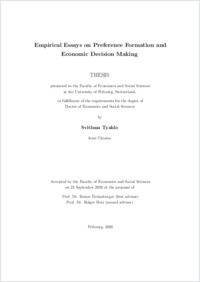Empirical Essays on Preference Formation and Economic Decision Making
- Tyahlo, Svitlana
- Eichenberger, Reiner (Degree supervisor)
-
2020
1 ressource en ligne (145 pages)
Thèse de doctorat: Université de Fribourg, 2020
Éducation
Formation
Travail
Bilinguisme
Femmes
Français (langue)
Allemand (langue)
Choix intertemporel
Prise de décision
Guerre du Donbass (2014-....)
Politique et gouvernement
Ukraine
Suisse
English
This dissertation consists of four independent papers on economically relevant topics that cap- tured my attention because of personal background and professional experiences, such as coming from Ukraine, being an educated woman, living in a bilingual Swiss region and observing people delaying their work. Throughout my papers, I empirically analyze the determinants of individual attitudes and behavior that entail important economic consequences. In particular, the first two papers are observational studies related to political economy and labor market policy, respectively, while the last two papers involve incentivized intertemporal choice experiments. Analytical meth- ods are carefully chosen to address specific research questions given the quantity and quality of data. Since the primary goal is to establish causal relationships, the results and thus the identi- fying assumptions are challenged with transparent robustness checks and critical discussions. The papers are organized in chapters as following. Chapter 1 evaluates the impact of the ongoing war in eastern Ukraine on the political attitudes towards Ukraine and Russia among the population in the war-affected area controlled by the Ukrainian government. This topic is important because political sentiments can shape political powers, voting outcomes and thus prospective institutions, which will govern approaches to conflict resolution and post-war economic recovery in the region. The war geography allows defining two groups of citizens with different war exposure. Based on unique survey data from 2013 (prior to the war) and 2015 (after the outbreak of the war), a before-after analysis and a difference-in-difference approach are applied to examine the effect of war exposure. The results indicate that one year of conflict negatively affected attitudes towards Russia, while no statistically robust differences are found for sentiments towards Ukraine. These findings are in line with the outcome of the 2014 Ukrainian parliamentary elections, when the pro- Russian vote substantially dropped in eastern Ukraine compared to the previous elections. In Chapter 2, I investigate long-run effects of education on female labor market attachment mediated by realized fertility. In the context of population ageing, educated women are an im- portant resource of labor supply. Investments into female education, however, raise opportunity costs of motherhood in terms of forgone earnings, leading to a trade-off between labor force par- ticipation and fertility decisions. It is therefore important to understand whether education in- creases female working lives mainly through reduced fertility. Using mediation analysis supported by the rich data from the Survey of Health, Ageing and Retirement in Europe, I find that school- ing is positively associated with employment status, working hours and labor survival age of older women. Education-induced fertility modestly contributes to the total schooling effects, which is stimulating news for policy makers. Chapter 3 sheds light on the relationship between language and time preferences. While re- cent evidence suggests that the grammatical association of the present and the future in a lan- guage positively correlates with patience across language groups, the underlying mechanisms re- main unclear. Our study compares time preferences of two language groups that differ in their encoding of time. More precisely, we conduct incentivized choice experiments among French and German speakers in a bilingual region in Switzerland, with shared institutions and very similar socioeconomic conditions between the two language groups. We find that German speakers are significantly more patient than French speakers, and differences are particularly pronounced when immediate payments are involved. The estimated preference parameters of a quasi-hyperbolic dis- counting model suggest that German speakers display lower discounting and are significantly less prone to present bias than French speakers. Chapter 4 also examines intertemporal choice behavior. The context however differs. In a randomized real-effort experiment with Amazon Mechanical Turk workers, I study the impact of social comparison on intertemporal choice. Social comparison entails varying information about effort reallocations of previous participants who completed a similar task. I find that social compar- ison affects effort allocations of men and women differentially. Observing that 48% of past partici- pants behaved time-consistently, men are significantly more likely to make dynamically consistent choices, while women are significantly less likely to do so. On average, men also exhibit signif- icantly smaller estimates of the present-bias parameter of a quasi-hyperbolic discounting model. I further find that observing peer procrastination significantly increases the propensity of women to behave time-consistently but does not affect men. These findings suggest that gender-specific social comparison based on situational similarity can be an effective solution to dynamic inconsistency in effort even when individual time preferences are not known beforehand.
- Faculty
- Faculté des sciences économiques et sociales et du management
- Language
-
- English
- Classification
- Economics
- Notes
-
- Ressource en ligne consultée le 28.09.2020
- License
- License undefined
- Identifiers
-
- RERO DOC 329383
- RERO R009084934
- URN urn:nbn:ch:rero-002-121144
- Persistent URL
- https://folia.unifr.ch/unifr/documents/308838
Statistics
Document views: 374
File downloads:
- TyahloS.pdf: 369
